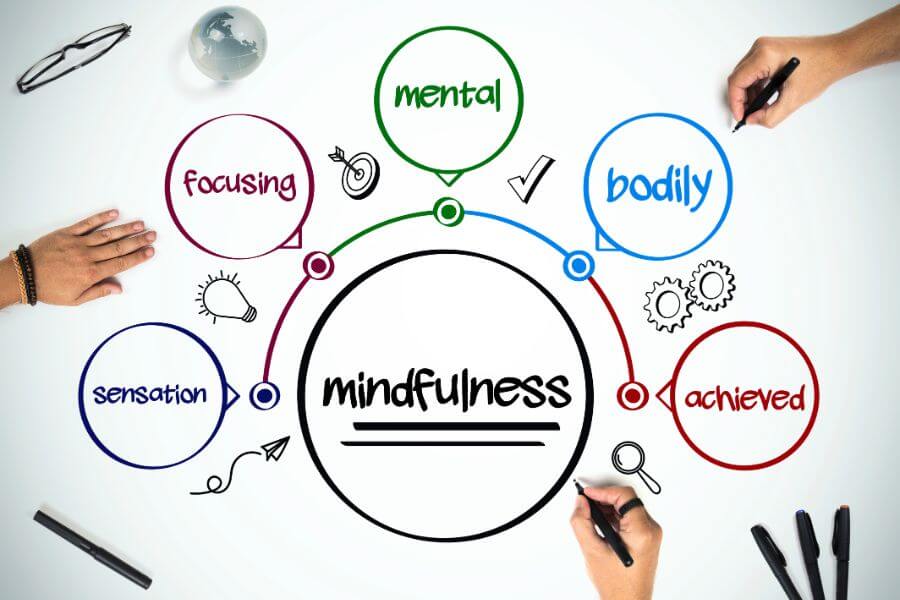The concept of mindfulness has been gaining traction in recent years, as individuals seek methods to enhance their mental health and overall well-being. But did you know that practicing mindfulness can also serve as a potent mechanism in realizing your dreams and accomplishing your goals? This article delves into the link between mindfulness and manifestation, highlighting how the Mindfulness benefits of integrating mindfulness into your daily regimen can assist you in crafting the life you aspire to.
What is Mindfulness?
Mindfulness is a mental practice that involves paying full attention to the present moment, without judgment. It encourages an awareness of one’s thoughts, feelings, bodily sensations, and the surrounding environment through a nurturing lens. This practice, often associated with meditation, helps individuals ground themselves in the now, fostering a state of calmness and clarity. By learning to observe their experiences without reacting, people can better manage stress, anxiety, and negative emotions, leading to a more balanced and fulfilling life.

The Importance of Mindfulness Meditation in Modern Daily Life
In our fast-paced, modern world, the importance of mindfulness cannot be overstated. The constant barrage of information, notifications, and the demands of daily life can lead to heightened stress levels, diminished mental health, and a pervasive sense of being overwhelmed. Incorporating mindfulness into our daily routines serves as a stabilizing force amidst the chaos. It allows us to pause, breathe, and reconnect with the present moment, providing a much-needed respite from the incessant pace of modern life. Mindfulness practice fosters a sense of calm and focus, enabling individuals to approach their tasks, challenges, and interactions with a clearer, more composed mindset. This not only enhances personal well-being but also improves relationships, productivity, and overall quality of life. By making mindfulness a habit, we cultivate a space of inner peace that can profoundly transform our experience of the everyday.
Understanding Mindfulness
The Essence of Mindfulness
Mindfulness is a term that has transcended its origins to become a key element of psychological resilience, personal growth, and emotional healing in the Western world. At its core, mindfulness is the practice of being fully present and engaged in the moment, aware of our thoughts and feelings without judgment or distraction. This concept, rooted in Buddhist traditions, has been secularized and simplified for universal application, emphasizing the importance of anchoring oneself in the current experience.
The essence of mindfulness lies in its simplicity and accessibility. It is a practice that does not require any special equipment, location, or significant time commitment. It’s about cultivating an attitude of attention and care towards one’s current experience, thoughts, and surroundings. Mindfulness teaches us to observe the flow of our thoughts and emotions as they are, without trying to change or judge them. This acceptance and observation lead to a deeper understanding of oneself and a more compassionate perspective towards others.
Mindfulness Meditation: A Core Practice
Mindfulness meditation is the foundational technique for developing mindfulness. It involves sitting quietly and paying attention to thoughts, sounds, the sensations of breathing, or parts of the body, bringing your attention back whenever the mind starts to wander. This practice can vary in duration, from a few minutes to longer sessions, and can be adapted to fit the needs of the individual.
Mindfulness meditation is not about achieving a state of emptiness or absence of thought, but rather about becoming an observer of one’s mind. It helps in recognizing that thoughts and emotions are transient and do not define one’s self or reality. Regular practice of mindfulness meditation has been shown to reduce stress, improve focus, and contribute to a greater sense of peace and well-being.
The Scientific Underpinnings of Mindfulness
The benefits of mindfulness and mindfulness meditation are not just subjective or based on personal testimonials; they are also backed by a growing body of scientific research. Studies have shown that mindfulness practices can lead to structural and functional changes in the brain, a phenomenon known as neuroplasticity. These changes are associated with improvements in attention, emotion regulation, and reduced reactivity to stress.
Research into mindfulness-based stress reduction (MBSR) and mindfulness-based cognitive therapy (MBCT) has demonstrated significant benefits in treating various psychological conditions, including anxiety, depression, and chronic pain. These therapies combine traditional cognitive behavioral therapy (CBT) techniques with mindfulness practices to help individuals better understand and manage their thoughts and feelings.
Furthermore, mindfulness has been linked to improved immune response, lower blood pressure, and enhanced cognitive function. The scientific community continues to explore the mechanisms behind these benefits, shedding light on how mindfulness practices can lead to healthier, more fulfilling lives.

The Wide-Ranging Benefits Mindfulness
The benefits of mindfulness extend far beyond stress reduction and improved mental health. Mindfulness can also positively impact areas such as relationships, creativity, and physical well-being.
• Relationships: By cultivating awareness and acceptance of our thoughts and emotions, we also become more attuned to the experiences of others. This deepened understanding leads to more empathetic and compassionate relationships.
• Creativity: Mindfulness practices can help individuals break out of rigid thought patterns and access a more open, creative mindset. By focusing on the present moment, we become more aware of our surroundings and able to see things from different perspectives, fostering original thinking and innovation.
• Physical Well-being: The mind-body connection is a well-established concept in medical science. Mindfulness practices such as yoga and tai chi have been shown to reduce inflammation, improve cardiovascular health, and enhance overall physical well-being. Mindful eating techniques can also aid in digestion and weight management.
• Better Sleep: Stress and racing thoughts are common culprits for sleepless nights. By incorporating mindfulness into our bedtime routine, we can calm the mind and promote relaxation, leading to improved sleep quality and duration.
• Enhanced Productivity: Mindfulness practices can help individuals become more focused, creative, and efficient. By training the mind to be present in the moment, we can overcome distractions and stay engaged with our tasks, leading to increased productivity and a sense of accomplishment.
Mindfulness-Based Cognitive Therapy (MBCT): A Path to Emotional Resilience
Mindfulness-Based Cognitive Therapy (MBCT) represents a groundbreaking fusion of cognitive behavioral strategies with ancient mindfulness practices, specifically designed to prevent the recurrence of depression. By teaching individuals to recognize and disengage from automatic cognitive processes that can trigger depressive episodes, MBCT empowers them to alter their relationship with their thoughts and feelings. The practice emphasizes observing thoughts and emotions from a distance, without judgment, which enables participants to perceive them as temporary and less overwhelming. This perspective shift is crucial for those vulnerable to depression, as it helps prevent the spiral of negative thoughts that often leads to relapse.
The benefits of mindfulness include improved mental and physical health, stress reduction, self-awareness, positive feelings, decreased stress, and enhanced psychological well-being. Research suggests that mindfulness meditation practice can benefit individuals with chronic pain, high blood pressure, depressive symptoms, and anxiety disorders. Mindfulness-based interventions have shown efficacy in treating various conditions such as post-traumatic stress disorder, borderline personality disorder, and work-related stress. Practicing mindfulness can lead to decreased stress, improved brain function, and enhanced overall well-being.
The effectiveness of MBCT lies in its structured program, typically spanning eight weeks, with group sessions guiding participants through mindfulness exercises and discussions to foster a new approach to stress and emotional pain. One hallmark technique is the “3-Minute Breathing Space,” encouraging momentary mindfulness throughout the day to disrupt automatic negative thinking. Research suggests MBCT reduces depressive relapse risk, highlighting its value in mental health treatment. By integrating mindfulness practices with cognitive therapy, MBCT enhances mental health and resilience, benefitting mindfulness meditation, mindfulness-based stress reduction, and mindfulness training.
Studies indicate benefits of mindfulness in physical and mental health, stress reduction, self-awareness, and psychological distress. The practice of mindfulness meditation can improve sleep quality, emotional health, and cognitive flexibility, with significant improvements in anxiety disorders and chronic pain.

Getting Started with Mindfulness Meditation
If you’re interested in incorporating mindfulness into your daily routine, there are many resources available to help you get started. Mindfulness meditation can be practiced alone or with a group, and there are various techniques and styles to choose from. Here are some tips for beginning your mindfulness journey:
1 – Start small: Begin with short periods of mindfulness practice, such as 5-10 minutes a day. As you become more comfortable, you can gradually increase the duration.
2 – Find a quiet and comfortable space: Choose a place where you feel calm and at ease to practice mindfulness. It could be in your living room, bedroom, or even outside in nature.
3 – Focus on your breath: One of the fundamental principles of mindfulness is focusing on the present moment, which can be achieved by paying attention to your breath. Notice the sensation of each inhale and exhale.
4 – Be patient and non-judgmental: Don’t worry if your mind wanders during mindfulness practice. It’s normal for thoughts to arise, and the key is to acknowledge them without judgment and gently bring your focus back to your breath.
5 – Use guided meditations: Many apps and websites offer guided mindfulness meditations that can help you stay focused and provide a framework for your practice.
Remember, incorporating mindfulness into our lives takes time and commitment, but the benefits are well worth it. By cultivating present-moment awareness, we can improve our mental and physical well-being, enhance relationships with ourselves and others, and ultimately live a more fulfilling life. So why not give it a try? Start your mindfulness journey today and see where it takes you!
Deepening Your Meditation Practice
As you continue your mindfulness journey, there are ways to deepen your meditation practice and incorporate mindfulness into your daily life. Here are some tips to help you take your practice to the next level:
• Attend a retreat: Consider attending a mindfulness or meditation retreat for a more immersive experience and dedicated time for practice.
• Practice mindful activities: Mindfulness doesn’t have to be limited to meditation. Engage in everyday activities with a mindful approach, such as eating, walking, or even washing dishes.
• Cultivate gratitude: Incorporate gratitude into your mindfulness practice by taking a moment to appreciate the things you are thankful for in your life each day.
• Connect with others: Join a mindfulness group or find an accountability partner to share experiences and support each other on your mindfulness journey.
• Make it a habit: Set aside time each day for mindfulness practice, even if it’s just a few minutes. Consistency is key in reaping the benefits of mindfulness.
• Keep learning: Continuously educate yourself on different mindfulness techniques and philosophies to deepen your understanding and enhance your practice.
By consistently incorporating mindfulness into our lives, we can continue to reap its many benefits and cultivate a deeper sense of peace and well-being. So don’t be afraid to explore and experiment with different mindfulness practices, and find what works best for you. With dedication and commitment, mindfulness can become an essential tool in managing stress, improving mental health, and living a more meaningful life.

Integrating Mindfulness Meditation into Daily Life
Besides formal meditation practice, mindfulness can also be incorporated into daily activities to help us stay present and centered throughout the day. Here are some ways you can integrate mindfulness into your everyday life:
• Mindful breathing: Take a few deep breaths before starting a task or when feeling overwhelmed to ground yourself in the present moment.
• Body scan: Throughout the day, take a few moments to scan your body for any tension or discomfort, and consciously relax these areas.
• Mindful walking: Pay attention to the sensation of each step as you walk. Notice the movement of your feet, legs, and arms, and the sights and sounds around you.
• Eating mindfully: Before eating, take a moment to notice the colors, textures, and smells of your food. Chew slowly and savor each bite, paying attention to the flavors and textures.
• Mindful listening: When in conversation with others, practice active listening by giving them your full attention and being fully present in the moment.
Mindfulness-Based Stress Reduction (MBSR) Program: An Overview
The Mindfulness-Based Stress Reduction (MBSR) program is an innovative approach that blends mindfulness meditation, body awareness, and yoga to enhance mental and physical health. Originating from clinical psychology and behavioral medicine, MBSR is designed to decrease stress, pain intensity, and psychological distress in individuals dealing with chronic illness, including those managing symptoms of obsessive-compulsive disorder, chronic low back pain, and even breast cancer survivors. Through mindfulness training and practicing mindfulness meditation, participants develop a greater capacity for self-regulation and emotional control.
Mindfulness Meditation: The Heart of MBSR
Key to the program’s efficacy is its structured mindfulness meditation practice, which encourages participants to become more aware of the present moment without judgment. This practice of mindfulness not only leads to reductions in stress and depressive symptoms but also fosters significant improvements in physical health markers such as blood pressure. Researchers in the fields of clinical psychology and behavioral medicine have found that practicing mindfulness meditation regularly can improve mental clarity, executive functioning, and increase trait mindfulness, which correlates with decreased psychological stress and improved health outcomes.
Beyond Stress Reduction: The Wide-Ranging Impact of MBSR
Mindfulness-based therapy, including mindfulness exercises and techniques taught in MBSR, has been shown to yield health benefits that extend beyond stress reduction, aiding in the treatment of anxiety, eating disorders, and promoting greater body awareness. This mindfulness program emphasizes the importance of mindfulness-based interventions and mindfulness therapy, employing mindfulness exercises and techniques to cultivate a consistent mindfulness meditation practice. Studies on mindfulness affect how the brain regulates emotions, with evidence suggesting that mindfulness meditators experience significantly less anxiety, improved self-esteem, and enhanced brain-related functions.
Randomized controlled trials focusing on mindfulness-based practices have illuminated how such interventions can alter brain activity, particularly in areas related to depression symptoms and anxiety. These studies confirm that mindfulness works on a neurological level, affecting the brain stem and improving overall brain activity related to stress and emotional regulation. Furthermore, mindfulness interventions have been linked to improvements in pain management for those with chronic conditions, underscoring the robust applicability of mindfulness in treating a variety of physical and psychological issues.
MBSR’s comprehensive approach, which includes mindfulness meditation, mindfulness techniques, and mindfulness therapy, provides a solid foundation for those looking to incorporate mindfulness into their lives. Whether it’s through mindfulness interventions in a stress reduction clinic or through individual meditation training, the benefits of mindfulness and mindfulness-based interventions are clear. The adoption of mindfulness-based stress reduction practices not only fosters greater physical and psychological well-being but also enhances one’s overall quality of life by promoting mental clarity, reducing depressive symptoms, and helping to manage chronic pain and psychological stress.
The Role of Mindfulness Training in Personal Development
Mindfulness training plays a pivotal role in personal development, offering tools for self-awareness, emotional regulation, and resilience. At the heart of this training is mindfulness meditation, a practice that has been closely studied and integrated into comprehensive programs like Mindfulness-Based Stress Reduction (MBSR). This mindfulness program, originally developed for treating chronic pain and stress, has shown immense health benefits, extending even to specific groups such as breast cancer survivors. By engaging in practiced mindfulness meditation, individuals learn to navigate the complexities of their emotions and thoughts with greater clarity and calmness. Researchers found that regular meditation training not only reduces pain intensity but also significantly aids in treating anxiety and depression, illustrating the profound impact of mindfulness on mental health.
Mindfulness techniques, cultivated through consistent mindfulness-based practices, foster an enhanced sense of self-awareness. This heightened awareness is crucial for personal development, as it allows individuals to recognize their habitual reactions and choose more constructive responses. Mindfulness affects various aspects of well-being, from psychological to physical, by encouraging a non-judgmental presence in the moment. Numerous mindfulness studies have documented the efficacy of mindfulness in reducing stress, improving attention, and promoting overall emotional balance. Furthermore, meditation training, a core component of mindfulness programs, equips individuals with the skills necessary for a lifelong journey of growth and self-discovery. Through the disciplined practice of mindfulness meditation, people can achieve a deeper understanding of themselves and unlock their full potential for personal development.

Final Thoughts
Mindfulness-based stress reduction programs like MBSR offer a holistic approach to mental and physical health, with the potential to transform one’s overall well-being. Through structured mindfulness training and mindfulness meditation practices, individuals can reduce stress, improve emotional regulation, and enhance self-awareness. As research on mindfulness continues to expand, it’s clear that this ancient practice has immense relevance in modern times, with the potential to benefit individuals in various aspects of their lives. So why not take a moment right now and practice a little mindfulness? Close your eyes, focus on your breath, and become aware of the present moment without judgment. You never know how much it could positively impact your life. So let’s continue to embrace mindfulness and its wide-ranging benefits for our physical, emotional, and personal development. So let’s continue to embrace mindfulness and its wide-ranging benefits for our physical, emotional, and personal development.







Leave a Comment